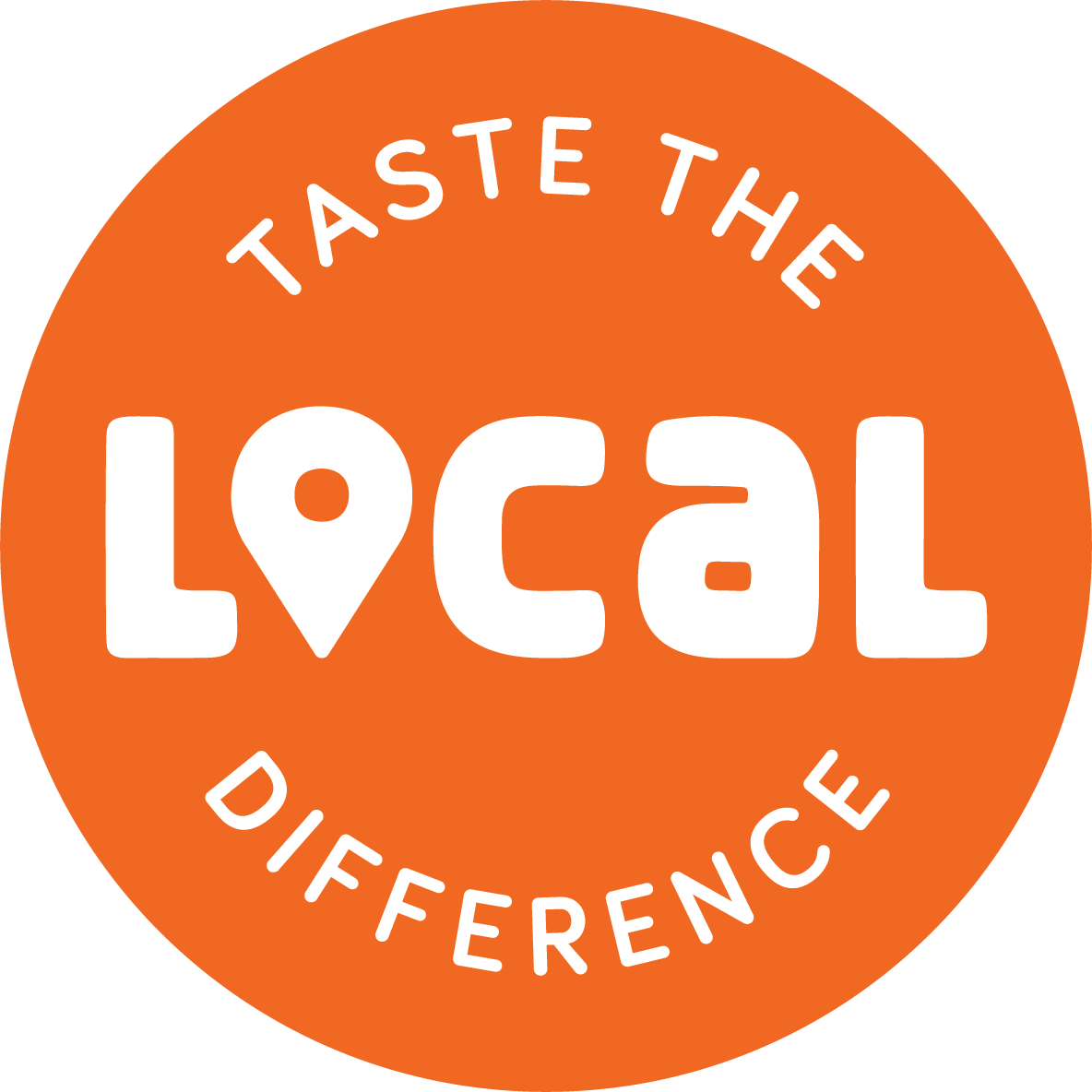When thinking about the Northwest corner of the Lower Peninsula, many people think of cherry trees and grapevines. What many locals also know is that our area is home to an incredible network of local food makers that seamlessly fit amongst the fresh fruits, vegetables and wines.
Cheese is a part of many restaurant menus and farmers markets, from aged Cheddars to fresh creamy goat cheese, and everything in between. And the cheesemakers behind each all have a unique story to tell that becomes a part of their creations. Luckily, they’re willing to answer questions that give us a window into the cheesemaking world! We’ve interviewed 4 of the area’s cheesemakers for a better understanding of this unique craft in Northwest Michigan.
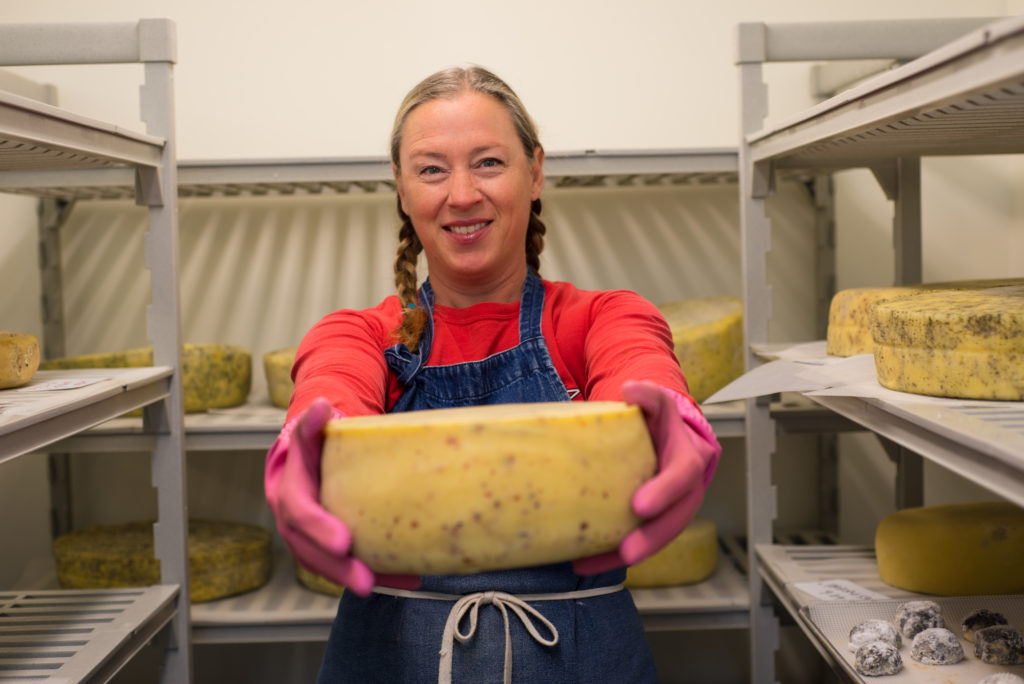
The cheesemakers:
Sue Kurta of Boss Mouse Cheese hails from Kingsley and makes aged cow’s milk cheeses on a historic 1867 Michigan Centennial farm.
Amy Spitznagel is the owner of Northport’s Idyll Farms, a farmstead creamery that has won 25 American Cheese Society awards (in 2017 and 2019 more than any other goat cheese producer in North America), 7 World Championship Cheese Awards, 5 US Championship Cheese Awards and a Good Food Award.
Dave Omar and his wife, Joy, own and operate Saltless Sea Creamery in Traverse City. They specialize in Mediterranean-style cheeses bringing terroir in from their use of Michigan ingredients.
Gary Smith is the new owner of Leelanau Cheese, which makes European-style cheeses, like Raclette and fromage blanc, in Suttons Bay.
Why did you choose cheesemaking?
Sue Kurta, Boss Mouse Cheese – It was a hobby that turned into my full-time work. In the late 00’s, I took a wine and cheese class in New York City where I lived, and it grew from there. I loved, and am still fascinated by, the natural, hand-made cheesemaking process. I loved spending time on small country farms and working around animals. I love the history of cheesemaking and how much it remains a part of human food culture.
Amy Spitznagel, Idyll Farms – We chose to start a farmstead goat creamery because it fit with the rolling terrain of the property, a goat cheese is a great pairing with local wines, and a fun adventure for our family. We wanted to produce a world class product that captured the terroir of Leelanau county.
Dave Omar, Saltless Sea Creamery – I learned to make cheese from my Lebanese grandmother and mother, who both made a fresh cheese called jibneh when I was a kid. I rediscovered my love for cheese working as a cheesemonger for six years and started making batches at home, until I was able to start my apprenticeship.
Gary Smith, Leelanau Cheese – I always loved science. As I learned more about cheesemaking, I came to recognize its strong ties to microbiology and chemistry. Cheesemaking is an applied science, and I love being able to use the knowledge I gained as a food science student at Michigan State University.
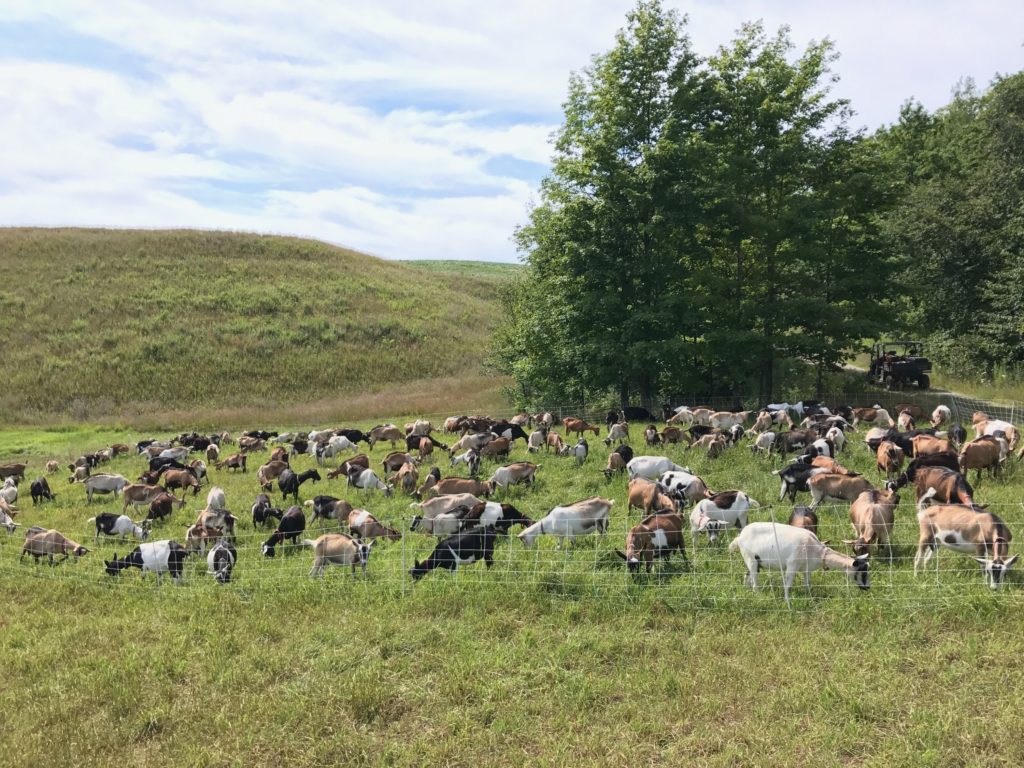
What is your favorite thing about your business and what you do?
Sue – I am ever grateful to our faithful and supportive customers, chefs, restaurants and caterers who support NW lower Michigan’s local foods culture. I still love making cheese, and look forward to it every “make day.” The day I don’t feel like that any longer is the day I will quit.
Amy– My favorite thing about my business is having complete vertical integration of our product, meaning that we are in control of every aspect of our cheesemaking, from the health and quality of our pastures, our goats, our cheese, our aging (affinage) and our product packaging and marketing. It has been an incredible learning experience to create our products from pasture to plate. Through our regenerative farming practices, we are reversing climate change and making the planet and its soil more viable and healthy than when we started.
Dave – I am partial to the process. If handled correctly, each cheese is unique in every place it’s made. By slowing the process down to its original methods and receiving only the highest quality, grass-fed milk, we’re able to let the place influence our flavors. To me, that’s particularly obvious with our ParMichigano and Riveter, as the different handling and aging methods on those cheeses allow for totally distinct flavors that are full and rich and familiar, and showcase the flavors possible with Michigan’s exceptional dairy products.
Gary – Honestly, my favorite part of the business is being able to work with my best friends, not a lot of people can say that.
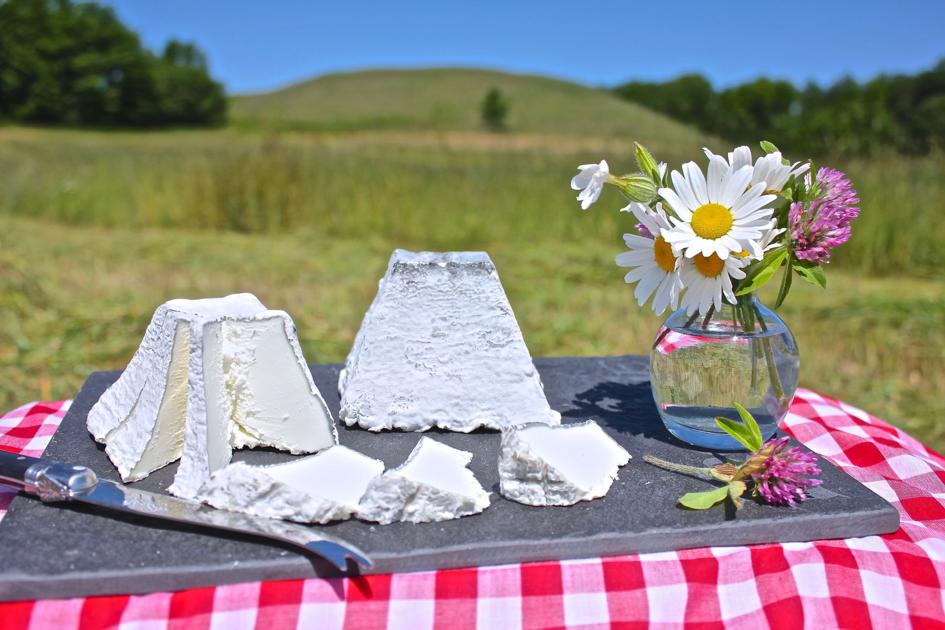
What is the most difficult thing to manage with cheesemaking?
Sue – The cheese aging process is finicky and changes daily with the season and weather. Also the endless cleaning, sterilizing, dishes, washing milk cans – food production is dirty work, and that part is tiresome.
Amy – The most difficult thing to manage with cheesemaking has been protecting the quality of our cheeses once it leaves our facility. We need to rely on our distributors and our end customers to transport, warehouse, store and ship our cheeses safely so that our quality is maintained to the end customer.
Dave – The aging. When we create a wheel of aged cheese, it takes between 60 and 360 days, depending on what we’re making. In that amount of time, we have to constantly manage temperature and humidity in order to create a consistent environment for cheese to age to exactly the right flavor and texture characteristics. So, all we have to do is create the perfect environment, every minute of every hour for however long the cheese requires. No bigs.
Gary – With our cheese, we have to remove the curd from the vat manually with a net. It is important to remove the curd as quickly as possible, this is a step we are constantly trying to improve!
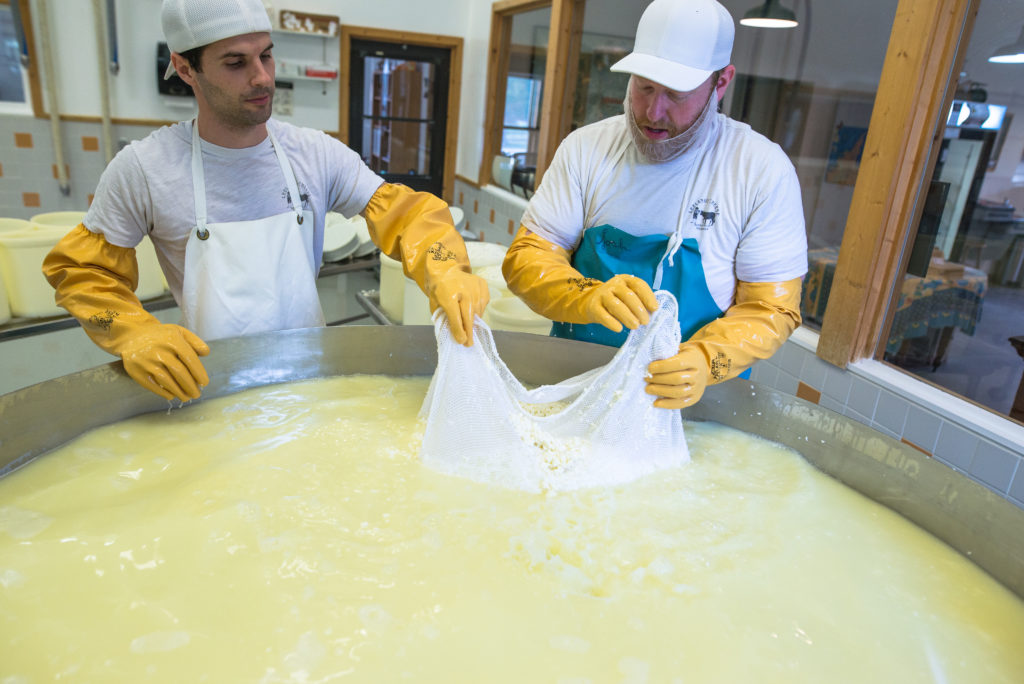
How does your process differ from major cheese factory brands?
Sue – I feel that making any food on a small scale is usually infinitely better than commercially produced products. The “Slow Food” movement of the 80’s really identified this concept. Producing cheese with 100% locally sourced ingredients is optimal for many reasons, and I believe the final product of a handmade, slowly-made wheel of cheese has depth of character and the mark of the maker that commercially produced cheese cannot reproduce.
Amy – Our process differs from major cheese brands because we are farmstead, using the milk that we produce from our own goats, so that we are completely vertically integrated and in control of all aspects of cheesemaking. Our goats are pasture raised, meaning they are rotated through our organic pastures using regenerative farming practices, producing the healthiest milk possible.
Dave – We do everything the traditional way, slowing every process down to the speed of a pair of hands. So when we measure quantities of things, when we set temperatures to curdle milk, or add cultures and rennet to create flavors; when we ladle curds into forms or press moisture out of newly formed rounds; when we brine, salt, press, flip, wash, wipe, taste, measure – decide anything and everything – it’s all done with our own hands. We don’t rush anything; we allow microbes and time the opportunity to create flavors that are extraordinary.
Gary – Scale of production is the most obvious answer here. We are making around 35,000 pounds of cheese annually versus millions of pounds per year. While we have several conveniences to help with processing, such as pumps for transporting milk from our tanker truck to our cheese vat and a motorized agitator to stir the milk/curd, much of our process is hands-on. For example, we cut the curd and remove the curds from the vat by hand. Major factory brands make “commodity cheese.” Commodity cheeses generally are low maintenance cheeses, such as colby jack and cheddar. After production these cheeses are put in vacuum sealed bags and are refrigerated while they age. Raclette is a much more labor intensive cheese, requiring daily maintenance and care. Every wheel is washed in a brine solution every day for the first three weeks, then every other day until it is sold. It is not economically feasible for commodity cheese makers to pursue cheese such as raclette.
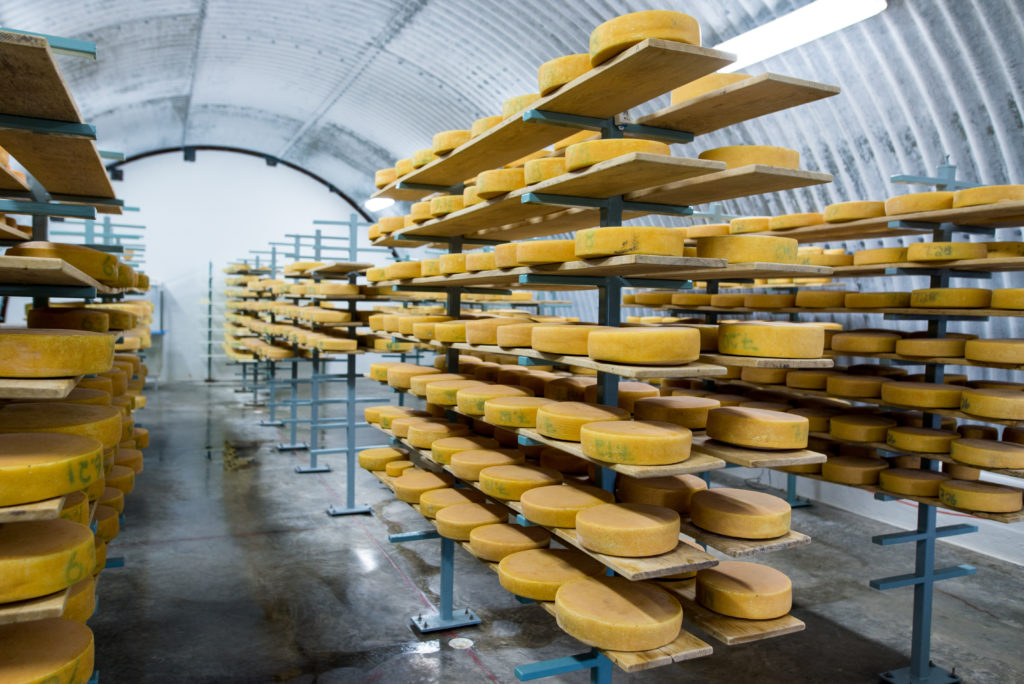
What’s your market like – who do you sell most to? Is there anything that surprised you about your customer base? What do you love about your customers?
Sue– My business is about 50/50 wholesale and retail. The folks at the local farmers markets are one of the best parts of my work – all the smiles, the warm and welcoming energy of the market community, meeting strangers, the random chats, and introducing folks to small batch cheese, which is uncommon. I have a deep desire to please them. Cheese is a pretty “happy” product to work with, and people are completely crazy about cheese.
Amy– Most of our sales are through our 3 distributors, Cherry Capital Foods, Carmela Foods, and Gourmet Foods International. We have some local wholesale accounts and we sometimes sell our products at the Northport Farmers Market and our summer farm tours. This summer, we opened the World’s 1st and only G.O.A.T. cheese vending machine that was open from July 4- November 4 next door to the Visitor’s Center in Northport. We love our local base and seeing our name on menus around Michigan and beyond. It gives us a sense of pride that our name means local as well as world class.
Dave – We predominantly sell directly to customers, as we started going exclusively to farmers markets. Pretty quickly we started receiving interest from grocery stores and restaurants, so we’ve continued ramping up to meet those needs as well. My biggest surprise and my favorite thing about our customers are the same: their excitement for big flavors. Working as a cheesemonger downstate, it was like pulling teeth trying to get people to try things they’d never heard of or that might be “strong” (whatever that even means). Up here, our customers are excited for new items with bold flavors.
Gary – The majority of our sales are retail through our storefront and online/phone orders. We knew that retail sales were strong when we bought the business, but we didn’t know just how many folks that come in the summer are first time customers!
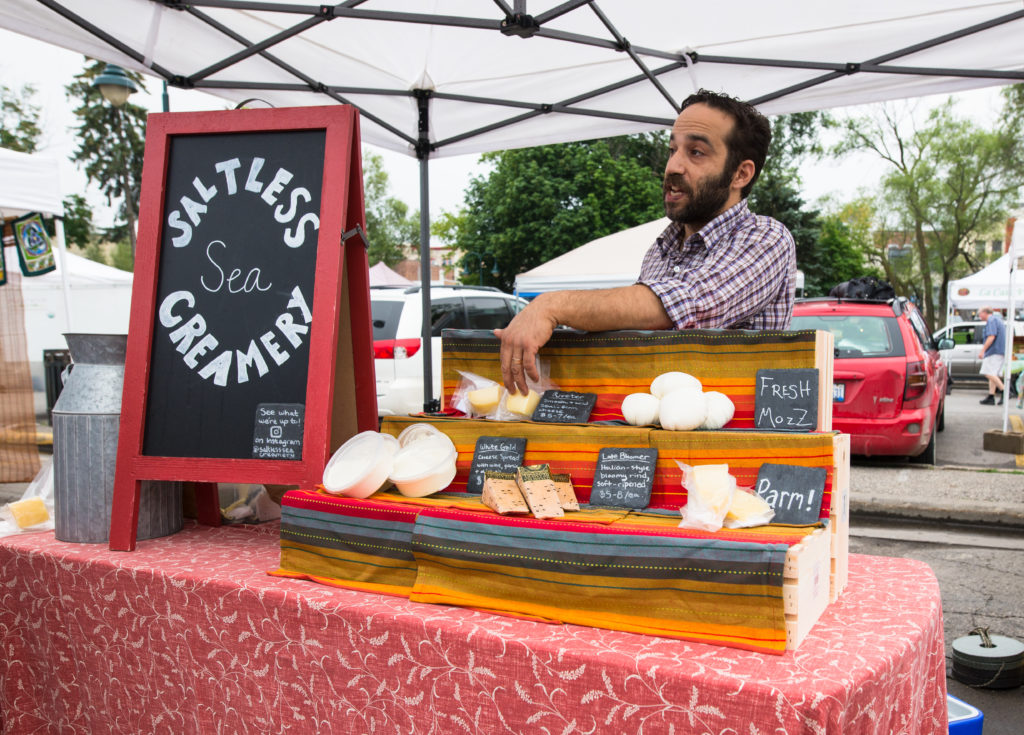
What’s your favorite style of cheese to make? What about to eat? Why are they your favorite(s)?
Sue– I get asked this a lot! My favorite cheese is just about any variety in the Cheddar family. While I specialize in aged cow’s milk cheese, I like many other styles. I love making fresh mozzarella! Fast and stretchy and so much fun.
Amy – When I’m asked which cheese we make is my favorite, I say it depends on the time of day! I like to eat our fresh cheeses (Idyll Pastures and Idyll Pastures spreadable) in the morning for breakfast with my eggs. I like the aged cheeses (Idyll Gris, Idyll Puck, Mont Idyll, Idyll Camembert, Idyllweiss and Temptation) for a midday snack or in the evening with a glass of wine.
Dave – I’m obsessed with parm. My ultimate goal is to make a wheel of parm so good that Italian people can’t tell the difference blindfolded. A wheel of parm so good that people throw awards at my head and I have to wear a helmet when I attend cheese competitions.
Gary – So far, of the cheeses I’ve made, Raclette is the most rewarding. It’s a labor of love, and the reward is one of the tastiest cheeses on the planet.
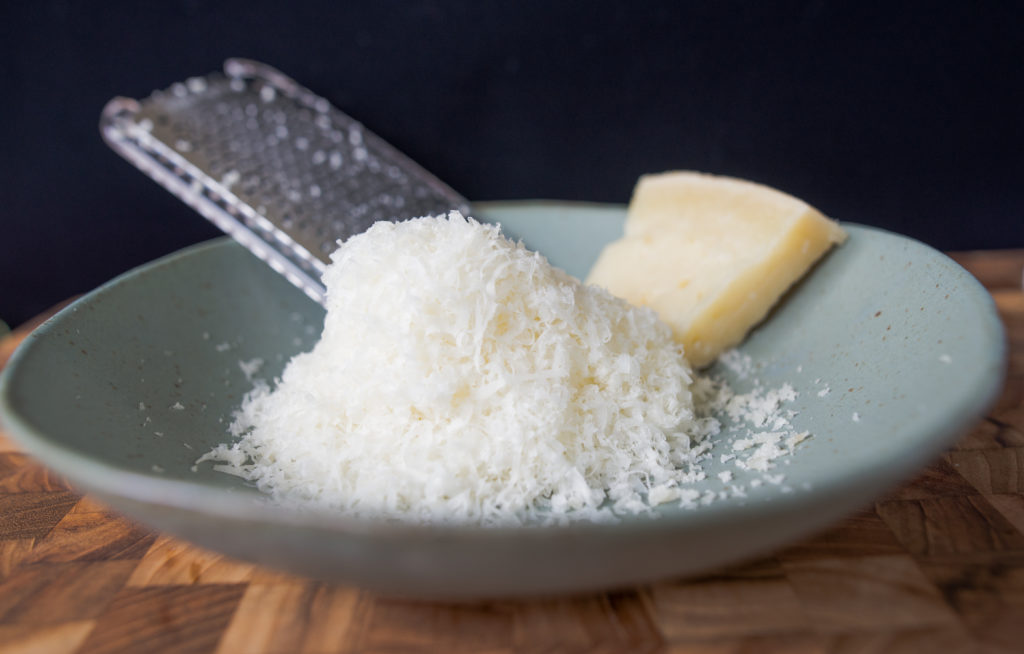
What’s the community of cheesemakers like here in Northern Michigan? What about the local food community in general – any successful stories of collaboration?
Sue – My friend and former mentee, Dave from Saltless Sea Creamery, is up and running after working with me when he was a brand new cheesemaker – I am proud of them. We don’t have a lot of local small cheese makers due to Michigan’s somewhat restrictive laws around dairy and milk. Also, sadly, I feel small scale cheese making is somewhat of a dying craft.
Amy – The community of cheesemakers is small in Northern Michigan. We have recently partnered with the new cheesemakers at Leelanau Cheese and are generating more synergy. Part of the problem is that we are all so busy! I would love to see a cheese trail, much like a wine trail someday when we all have the time! We have been on the menu at several local restaurants throughout the years, namely The Union, The Tribune, The Cook’s House, Wren, The Riverside Inn, Farm Club, Epicure Catering, NPG, and love the opportunity to showcase our product through the chef’s expertise. We have sponsored and donated to the Leelanau Conservancy. We have hosted an open farm tour with around 800 people with Oryana. We have partnered in the past with local wineries for special dinners, wine events and tasting menus. We continue to look for and welcome other local collaborations!
Dave – I’ve lived in a lot of places that claim to be forward-thinking and community-minded, but the northern Michigan community takes that to a whole different level. There are so many people intentionally focused on eating local that finding outlets for new products is different than anywhere I’ve ever been. I got my start by apprenticing with a cheesemaker here in town and all the connections I’ve made since then have been because the food producer community is so integral to the local economy and mentality.
Gary – Northern Michigan has a great collaborative environment and food community. The local food movement up here is on another level, from which we benefit greatly.
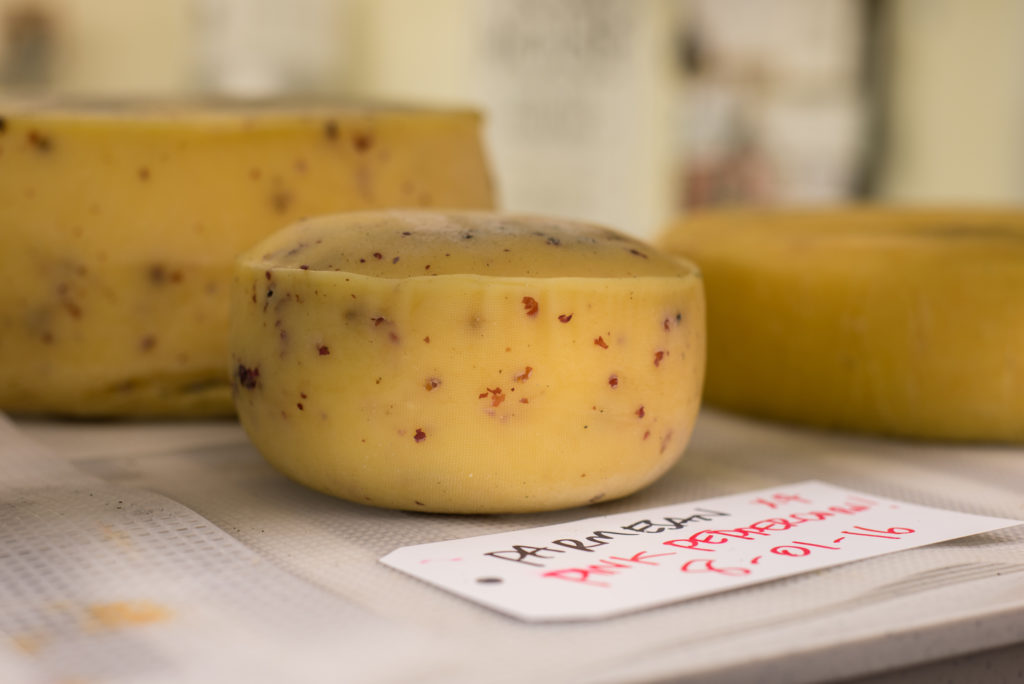
In your own words, why is it so important for our community to support their local cheesemaker?
Sue – I feel that supporting all local producers and makers – not just cheese – benefits our entire community by keeping the money local, keeping the footprint small, and consuming the highest quality, freshest goods grown and made right here. It’s how most of the world consumes goods, and I think it’s the natural, best way.
Amy – It is important for our community to support local cheesemakers so that they know where their food is coming from and the people and process it takes to make their food. We host farm tours and cheese tastings every summer (this summer, our tastings were at Northport’s Union) so that the community is familiar with our products and our practices and is aware of what makes us unique from other cheeses.
Dave – Cheesemaking is a multi-step process and – like anything that comes from the land – employs hardworking small business owners along every step of the way. Across America, we’ve seen family-owned dairy farms closed or swallowed up by huge corporations with unlimited funds. Michigan is America’s #7 dairy state by volume, and by purchasing local dairy products you’re ensuring that farmers and artisans can continue their legacy in the modern era. Locally- and family-owned companies put a huge percentage of their spending back into their local communities, and they are the ones who will make sustainable choices in their work and environment. By purchasing local dairy, you support a historic industry that employs thousands of Michiganders and continues to improve our state’s standing nationwide.
Gary – 1) Identifiable Food Source. People who want to connect with their food can literally come watch us make the product they can pick up in our storefront from a local source of milk. 2) Support the artisan cheese industry. Michigan is in the top 10 in the USA for milk production, but only has a handful of small-scale cheese makers. That can change with the support of our community!
Support your local cheesemakers! What is your favorite local cheese?
Claire Butler is a Communications Coordinator with Taste the Local Difference. Contact her at [email protected].
Further reading:
- NoMi Snack Board: Upgrade Your Grazing Game
- Homemade Flatbread Pizza (with Local Cheese)
